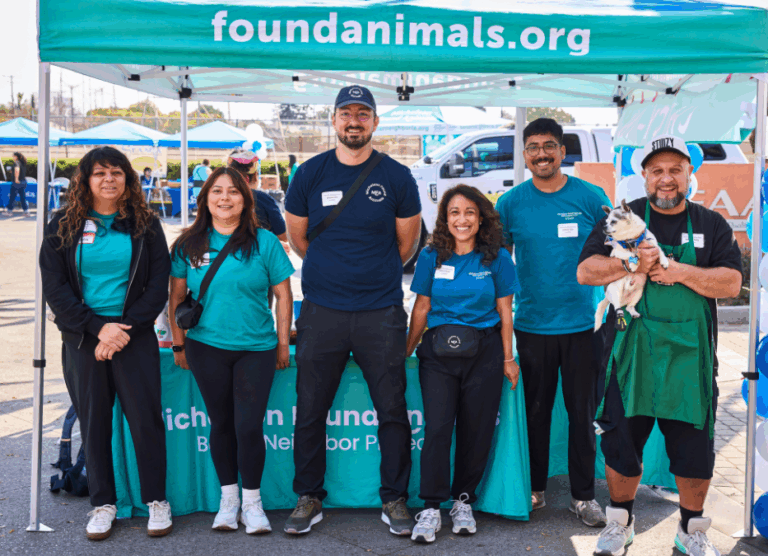Dr. Kwane Stewart, “The Street Vet”: Better Neighbor Hero Spotlight

Providing Pet Care for Homeless Pets
We are celebrating our first Better Neighbor Hero – Dr. Kwane Stewart, an individual who is actively making a difference for our underserved and homeless communities.
Meet Dr. Kwane Stewart. You may know him as “The Street Vet” from the television show that chronicles the generous work that he does for California’s homeless population and their pets.
We are proud to name Dr. Kwane Stewart a Better Neighbor Hero. We celebrate his unwavering dedication to serving the homeless community in Los Angeles and hope his story — and the stories of those he serves — will continue to bring empathy to the issue of homelessness.
We loved interviewing Dr. Kwane about what inspires him, and how he has seen pets impact the mental health of the community he serves. Check out his answers below!
Tell us, what made you decide to take personal action to help homeless people and pets?
I was inspired during the recession crisis. As a shelter vet, I was saddened to witness too many animals being surrendered for economic reasons. To a pet, the pet looking at you — you are their universe. You are everything to them. They rely on you for comfort and basic needs.
For the homeless, the relationship is on a totally different level. The bond is on a much higher plane than with the average pet owner, which I was blown away by. I saw them as the most vulnerable population struggling to get care for their pets. I wanted to help them and ease the suffering of their companions.
How have you seen pets help people experiencing homelessness?
As we’ve come to learn, pets provide mental stability and support. They give people a sense of purpose, responsibility and hope.
I’ve been told many times, “My dog is my reason for getting up in the morning.” Their pets give them hope.
What do you think is so powerful about the human-animal bond?
Science has proven a number of mental and healing benefits of pets. But I think some of it is still beyond the understanding of science. There’s an energy in the closeness and companionship that I know exists but is still hard to explain or prove.
What role do pets play in vulnerable communities, and why are they so important?
Every human wants companionship and purpose. When there is apathy in a community (which often comes with unemployment or hardship), I believe a pet has the power to heal and elevate that attitude.
How have you seen homeless individuals take care of their pets?
Remarkably well, sacrificing what little resources they have to keep their pets well. In fact, I’ve seen far more sacrifice from homeless individuals then I’ve seen from employed, middle-class people.
Can you tell us about someone you’ve helped who is especially memorable for you?
I met a homeless dog owner whose name was Mike. He had a cute little dachshund with silky hair. Her name was Crazy Girl, and he took great care of this dog.
Crazy Girl was blind; she had no vision at all. He said, “Can we fix it?” I told him I knew an ophthalmologist here in San Diego.
He said, “I wasn’t going to share this, but I have colon cancer. I’ve been dying of colon cancer, but I’m okay at the moment; I’m getting by. More than anything, I want Crazy Girl to have vision. If you can cure her, I’d be fine to keep the cancer.”
We got Crazy Girl to the specialist, and she had advanced glaucoma, so it wasn’t treatable. But Mike was still so grateful that we were able to stop the pain. For him, that was enough.
Mike checked in with me six months ago. The cancer had spread and he wasn’t doing well, but he was very inspiring. He just wanted to let us know that he was still very grateful to us for helping his little girl, his baby, and she was still with him.
We’ve heard you say “If you’re in a position to give back in your profession, then I think it’s your responsibility”. Can you tell us more about that?
I believe medical professionals (dentists, physicians and vets) have immense power to drastically change someone’s life, especially someone who is in need. If they are willing to go beyond their normal clientele and seek out people in desperate need, they can make a remarkable impact. I’ve realized that these situations may be fleeting to us (the professionals). But they often have a lasting effect that can alter the immediate (and sometimes long-term) course of a homeless person’s life.
What do you encourage people in the community to do to help those in vulnerable populations?
Be kind. Donate if you can. Take the time to listen and talk to them. Sometimes they just want normal human interaction. Ask your vet if they might consider sponsoring a homeless person’s pet for pro bono care.
Thank you, Dr. Kwane, for all you do. Your generosity and kindness in caring for homeless pet owners and their pets make you the perfect choice for our first Better Neighbor Hero.
How You Can Help Homeless People and Pets
If Dr. Kwane’s story inspires you, please help by donating to the Street Vet GoFundMe. Dr. Kwane has provided routine care and vaccinations with funds from his own pocket. Your donation will enable him to provide expensive surgical procedures for dogs that need them as well as resources for homeless pet owners.
There are many other ways you can help to keep homeless pet owners and their pets together. Check out our suggestions on how to get involved in your own community, or read more about the Better Neighbor Project.
Found Animals also invites you to learn more about our partners in creating homeless shelters for people and pets – The Giving Spirit and A Bridge Home.
To read more about Dr. Kwane and how he cares for homeless pet owners and their pets, visit his profile at GoFundMe Heroes.



